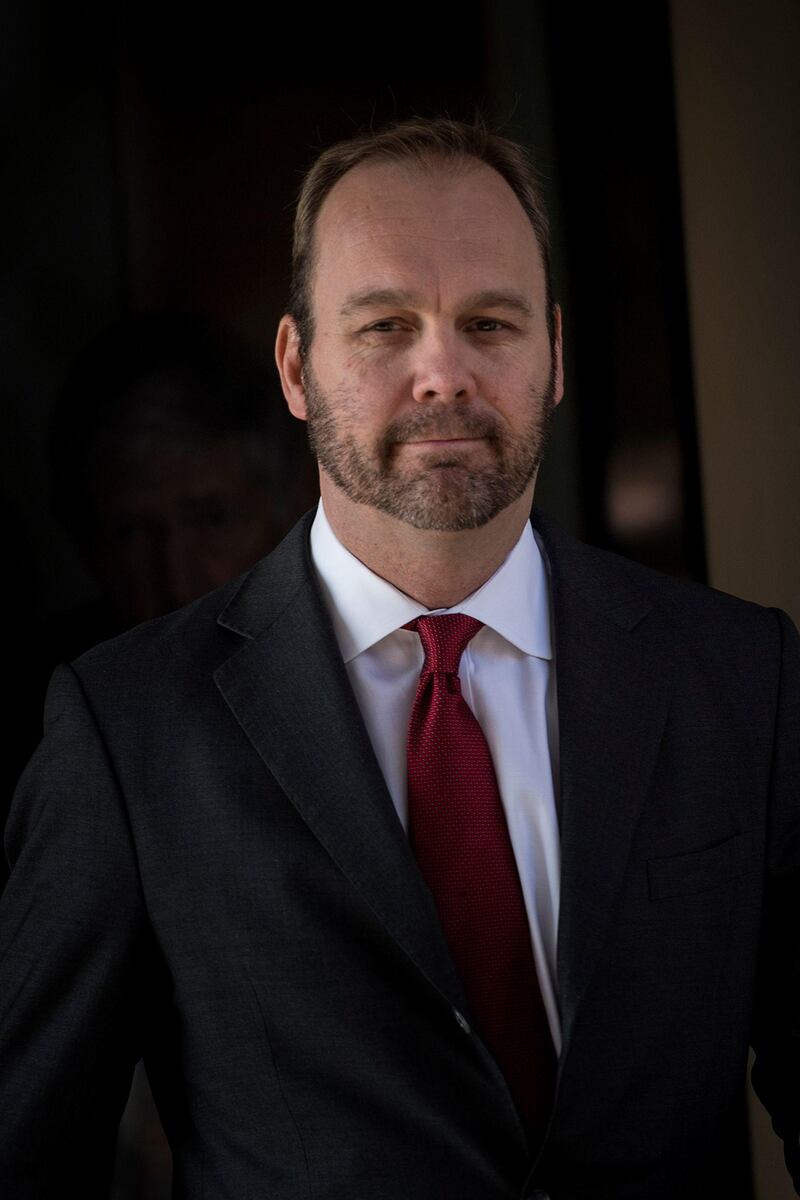The US government's star witness in the financial fraud trial of Paul Manafort testified on Monday that he embezzled hundreds of thousands of dollars from the former Trump campaign chairman — and told jurors that he and Mr Manafort committed the crimes together.
Rick Gates has been regarded as a crucial witness for the government since he pleaded guilty this year to two felony charges and agreed to co-operate in special counsel Robert Mueller's investigation into possible ties between Russia and the Trump campaign.
The hugely anticipated courtroom showdown brought Gates face-to-face with his longtime business associate and fellow Trump campaign aide. His testimony, given in short, clipped answers as Mr Manafort rarely broke his gaze from the witness box, follows that of retailers who detailed Mr Manafort's luxurious spending and financial professionals who told jurors how the defendant hid millions of dollars in offshore accounts.
But Gates, described by witnesses as Mr Manafort's "right-hand man", is expected to provide the most damning testimony about Mr Manafort's state of mind as well as his own role in the crimes.
Gates told jurors that he siphoned off the money without Mr Manafort's knowledge by filing false expense reports. He also admitted to concealing millions of dollars in foreign bank accounts on Mr Manafort's behalf and to falsifying loan applications and other documents to help Mr Manafort obtain more in bank loans.
"We didn't report the income or the foreign bank accounts," Gates told jurors, noting that he knew he and Mr Manafort were committing crimes each time.
Gates read off the names of more than a dozen shell companies he and Mr Manafort set up in Cyprus, St Vincent and the Grenadines and the United Kingdom to stash the proceeds of Mr Manafort's Ukrainian political consulting work.
He said he repeatedly lied to conceal the bank accounts and, at Mr Manafort's direction, would classify money that came in as either a loan or income to reduce Mr Manafort's tax burden.
_______________
Read more:
[ Manafort’s financial staff reveal opaque nature of his finances ]
[ Prosecution seeks to use Manafort’s millions against him ]
[ Prosecutors tell jury ex-Trump campaign chief Paul Manafort hid wealth ]
_______________
Asked whether the money in the accounts was income to Mr Manafort, Gates said, "it was".
Mr Manafort's defence has sought to blame Gates for any illegal conduct and accused him of embezzling millions of dollars from Mr Manafort.
Gates, who also served in a senior role in Donald Trump's presidential campaign, is expected to face aggressive cross examination once prosecutors are finished questioning him. He pleaded guilty to financial fraud and to lying to investigators as he negotiated a plea agreement, something defence lawyers will no doubt seize on to try to undercut his credibility.
He is awaiting sentencing.
The criminal case has nothing to do with either man's work for the Trump campaign and there's been no discussion during the trial about whether the Trump campaign co-ordinated with Russia — the central question Mr Mueller's team has tried to answer. But Mr Trump has shown interest in the proceedings, tweeting support for Mr Manafort and suggesting he had been treated worse than the notorious US gangster Al Capone.
US District Judge TS Ellis III, who repeatedly interrupted prosecutors last week as they tried to present evidence about Mr Manafort's lavish life — including $900,000 in expensive suits and a $15,000 ostrich jacket — clashed again with prosecutor Greg Andres on Monday when Mr Andres delved into the status and identities of the Eastern Europeans who made payments to Mr Manafort.
Mr Ellis said all that's relevant is that Mr Manafort was paid and whether he hid the income from the IRS.
"It doesn't matter whether these are good people, bad people, oligarchs, mafia. You don't need to throw mud at these people," Mr Ellis said.
Mr Andres said he was entitled to show the jury why Mr Manafort was getting tens of millions of dollars in payments.
"When we try to describe the work, your honour stops us and tell us to move on," he said.
Prosecutors say Mr Manafort used those companies to hide millions of dollars from his Ukrainian consulting work, proceeds he omitted year after year from his income tax returns. Later, they say, when that income dwindled, Mr Manafort launched a different scheme, shoring up his struggling finances by using doctored documents to obtain millions more in bank loans.
All told, prosecutors allege that Mr Manafort failed to report a "significant percentage" of the more than $60m they say he received from Ukrainians. They aimed to show jurors how that money flowed from more than a dozen shell companies used to stash the income in Cyprus.
On Friday, a tax preparer named Cindy Laporta admitted that she helped disguise $900,000 in foreign income as a loan in order to reduce Mr Manafort's tax burden. Ms Laporta, who testified under an immunity deal with the government, acknowledged that she agreed under pressure from Gates to alter a tax document for one of Mr Manafort's businesses.
Under cross-examination, she said at the time she believed Mr Manafort was directing Gates' actions and "knew what was going on".
Defence lawyers are trying to convince the jury that Mr Manafort was consumed by his consulting business and left the particulars of his finances to professionals and, in particular, to Gates.






